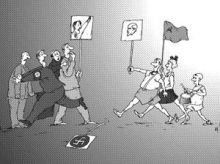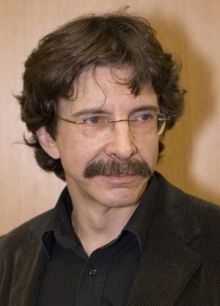The Russian Federation’s State Duma recently made a statement on occasion of the 65th anniversary of the Nuremberg Trials. According to the document, “the attempts to put the blame for unleashing World War II not only on Nazi Germany but also the Soviet Union, which initiated the foundation of this tribunal, are a deliberate falsification of history.” The statement also says that any attempts to reverse, deny or distort the decisions of the International Military Tribunal “should be regarded as violation of the universally recognized principles and norms of international law, as an obvious counteraction to the UN’s will.” Moreover, the draft statement protests against the attempts to equate the Nazi regime of Hitler’s Germany and the Soviet system. A similar statement was also made by the international human rights movement World without Nazism. In the article “Do not Allow History to Be Falsified” posted on the newspaper Izvestia’s website, its chair Boris Spiegel took a critical approach to the attempts to revise history and equate the Soviet and Nazi regimes. “We consider it inadmissible to equate the Nazi and Soviet regimes — those who established the Auschwitz death camp and those who extinguished its ovens, those who wiped out millions of Jews and representatives of other ethnicities and those who saved them. It is inadmissible to put on the same level those who committed the genocide of Jews, Gypsies and Slavs and those who fought those criminals,” the article says. Spiegel also condemned the attempts of European states, aimed at equating the totalitarian regimes of Germany and the Soviet Union: “What also draws our attention and arouses indignation are the irresponsible attempts of the Czech Republic’s Prime Minister Petr Necas and the Civic Democratic Party that he leads, as well as leaders of the two other ruling parties, Foreign Minister Karel Schwarzenberg and Interior Minister Radek John, to pass a law that pronounces fascism and communism as totalitarian phenomena of the same nature.”
What righteous wrath! But, in essence, these are just the commonplace phrases that expose the fact that the Soviet Union found itself in the anti-Nazi alliance because of circumstances beyond its control. For those who concluded the Molotov-Ribbentrop Pact did not think about anti-Nazism. Moreover, addressing a Supreme Soviet session in October 1939, the then Chairman of the Council of People’s Commissars, Vyacheslav Molotov, lavished praise on Nazism and condemned the so-called warmongers, Britain and France. Stalin said the same in a well-known interview with the newspaper Pravda in the same period. Yet the reason for conflict was simply that Europe was too small for the two dictators. They failed to divide the continent and, as a result, found themselves in opposite camps.
What distinguished them? Practically nothing. There were no gas chambers in Soviet concentration camps because there was no need of them. Siberia is boundless. What was done by the gas chambers of Auschwitz and Treblinka was equally successfully done by the oppressive and cold climate of Siberia, the Far East, and, in a way, Central Asia. Entire nations were deported on no reasonable grounds. People would die en route; half of them, at best, would reach the destination, and the rest died of cold, starvation, and backbreaking toil. Is it not genocide? The Soviet soldier routed Nazism and saved the peoples of Europe, but this raises quite a natural question: saved them from what?
Naturally, it is the soldiers’ fault that they were followed by NKVD and other organizers of a radiant future. It makes no difference to Poles, Czechs, Hungarians or Slovaks what hue of totalitarinism followed so-called liberation.
If the USSR was such a good fighter against Nazism, why did it hand over a large number of German communists and anti-Nazis to Gestapo? Did Moscow not know what fate awaited them? Now the latter-day defenders of the “efficient manager” are passing off what was a crime even under the then Soviet law as an act of political wisdom and necessity. The idea was to appease Hitler and thus postpone the war. But, maybe, they should not have started it at all? Before the partition of Poland, the USSR did not border on Germany, so any kind of war was out of the question. The Soviets should not have stabbed Poland in the back when it was quite successfully fighting Hitler. If they wished so much to prevent a war on their own territory, they should have rendered the Poles all kinds of help, which might have sobered up the aggressor. Instead, as a result of joint military parades in Brest and Grodno, the Soviets received an aggressor beyond the River Bug and supplied him with strategic materials, thus enabling him to make tanks and planes which later sowed death on our land.
That Nazism was on trial in Nuremberg is an act of ultimate justice. But, under the laws of conscience and fairness, there should have been a similar trial of Stalin, all his henchmen, and the party that plunged our people into a historic catastrophe. And the fact that we have not yet held Nuremberg Trials of our own tells much about the situation in our country.
Russia is still rife with Stalin’s successors — perhaps in the ideological, rather than the literal, meaning of the word. They categorically deny any parallels between the two totalitarian regimes. Yet they fail to find any differences, for there is too much in common. This is why official statements are hurling threats and curses at all those who think otherwise. On the other hand, Russia has seen the publication of a large number of books that say that the tribunals, which convicted big and small Nazi criminals, handed down unfair rulings. They claim that Hitler was not a bad guy after all: he kept or almost kept his promises to clear Germany of the Jews and provide the Germans with a prosperous life. So there was no reason why he and his regime were to face trial. This is occurring in Russia, where the ruling class is so proud of the victory over Nazism. As a result, even others get a rap over the knuckles. Moreover, concepts are confused, in the spirit of Soviet propaganda.
Nobody calls the Nuremberg tribunal’s rulings into question, although there are some purely juridical remarks about the course of the trial. The allies followed in the wake of Stalin and refused to consider the causes of World War II. Bad luck: we would perhaps be breathing much easier now.
The past will only stop shooting at the future when a solid line is drawn, and it remains an issue for academics and experts, rather than for politicians. Judging by the actions of the Russian authorities, there is still a long way to go. And it is, above all, the Russian people who are going to suffer the most because they are still being fed with false ideologems of the “great past,” whereby red totalitarianism is far better than its brown cousin. It turns out that the whole matter is in the color and all the rest is slander.
Eternal Nuremberg
States have been committing crimes from times immemorial. Sometimes the wrongdoers were punished by the enemy, the rebellious subjects, or Fate itself. But more often than not the victims had to content themselves with the biblical maxim “Vengeance is mine; I will repay.” This centuries-old procedure was broken 65 years ago in Nuremberg. For the first time in history, state-perpetrated evil was condemned by the trial of peoples, on a global level, with a thitherto unknown formulation “for crimes against humanity.” It was condemned as an ideology and as a practice, without statutes of limitation, over national borders. Germany would have never had any de-Nazification without the Nuremberg Trials, and there would have been no Nuremberg Trials without a military defeat and occupation by the allied forces.
In the time of victories, all (except those driven into death camps) were happy, crematoriums quietly smoked, gas chambers worked interruptedly on the “final solution of the Jewish question,” highways were built, Volkswagens were manufactured, and the Fuehrer seemed to a Santa Claus with a bag of gifts. The Germans came to their senses when they ran out of food and came under allied bombings. They were lucky because the mad Fuehrer decided to fight against the whole world at once. Germany could not evade retribution and the stars decreed that the coauthors of the war, who had signed the Munich Agreement and the Molotov-Ribbentrop Pact, and were forced into a united anti-Nazi alliance by Hitler’s mania to conquer the entire planet, should collectively condemn the Holocaust and the Reich’s military crimes. Had it not been for Nuremberg, the Nazi Party could have announced a perestroika of its own and the National Socialists would have been vying with the Christian Democrats for power, laying flowers at the graves of Nazi bosses, and viewing Hitler as an efficient manager. This is exactly what happened to Stalin and the Communist Party in the USSR. History showed that self-blame is not sufficient here. Totalitarianism cannot be cured from inside.
Some human rights champions are whispering bashfully that the Nuremberg Trials were formally illegitimate, execution was too much by present-day standards, Wehrmacht generals Keitel and Jodl just obeyed orders, and Ribbentrop was not personally involved in the Holocaust. Of course, the US sergeant who sold pieces of the noose as souvenirs does not exactly inspire affection. But the Gestapo, concentration camps, and gas chambers relied on the Wehrmacht’s machine-guns and tanks, highly-skilled German diplomacy, and the theory of “racial perfection.” Among those who were to be held responsible for this nightmare were the political leaders, the ruling party and its ideology, as well as the last guard whose job was “only to open the gas chamber door.” Who knows? Had it not been for Nuremberg death sentences, we might see now books such as Walking next to the Fuehrer or The Way I Was Solving the Jewish Question. Nuremberg Trials saved and redeemed the German people, helped it ward off the spectre of Nazism. And we have seen on the example of our own country what it is to live without a Nuremberg Trial. In the early 1990s Vladimir Zhirinovsky successfully sued the magazine Stolitsa for a collage of his side view and that of Hitler. The court ruled that the Liberal Democratic Party and Zhirinovsky had not been convicted in Nuremberg and, therefore, they were not Nazis. There is no crime in the eyes of a man in the street unless there is some documental proof.
The GULAG Archipelago, the works of Vasily Grossman and Varlam Shalamov, and The Black Book of Communism could have been enough for us. But they were not. So, sooner or later, we will have to hold in-absentia and posthumous Nuremberg Trials, and ban another inhuman practice and another utopian ideology. The choice is small, and not only in this country: either every country will have to organize a Hague tribunal of sorts (it would also be inexistent if there had been no Nuremberg Trials) on its own, or we will have to eternally embrace the smiling skeletons in our closets.
A brief course on the Nuremberg Trials
The State Duma has made a statement on occasion of an anniversary of the Nuremberg Trials of Nazi war criminals.
In particular, the document emphasizes that it would be sacrilegious to equate the Nazi and Soviet regimes. Unless Russia stops fooling around with Soviet historical nonsense, we will not budge even by a millimeter.
Many like this place, so it is protected with the moats and cleats of “originality.” A specific “mentality,” a specific faith, a specific history…
State Duma members exploded with an appeal to peoples on the occasion of another almost red-letter anniversary of Nuremberg Trials.
A noble thing to do… We really must remember. But the bombastic MPs turned urbi et orbi in order to push around their neighbors, who are painfully trying to draw conclusions from their past and to exclude once again the shameful and, to quote Putin, “amoral” secret protocols from the factors that allowed Hitler to wage war.
Stalin shed our blood to atone for his self-interested flirtation with Nazism.
The allies made a deal before the Nuremberg trial that they would not pick at each other. During the trial, the Soviet Union was almost caught with the Katyn affair. And, smelling the rat, the allies hushed up the matter. Moreover, as a sign of gratitude, they let the USSR become the only country that kept all that it had conquered in the times of the Stalin-Hitler non-aggression pact and the German-Soviet Treaty of Friendship, plus a half of Europe, under its control.
Having separated again from all the others and committing atrocities on most of its territories, Stalinism showed itself a loyal continuer of worldwide repression and state-sponsored terrorism.
In conclusion of his dictatorial career, Stalin gave the world, which was becoming aware of the Holocaust’s true scale, a clear signal of his affinity with its prewar partner — an anti-Semitic campaign and the “doctors’ case.”
The Nuremberg Trials had already finished by then and handed down an unshakeable ruling.
But secret documents were found, the scale of terror was revealed, albeit to a limited extent, and, a few dozen years later, the USSR itself broke up. The now opened archives show a much more complicated and bloody history.
So shall we now try to escape responsibility by hiding the truth, with a brief course on the Nuremberg Trials?









